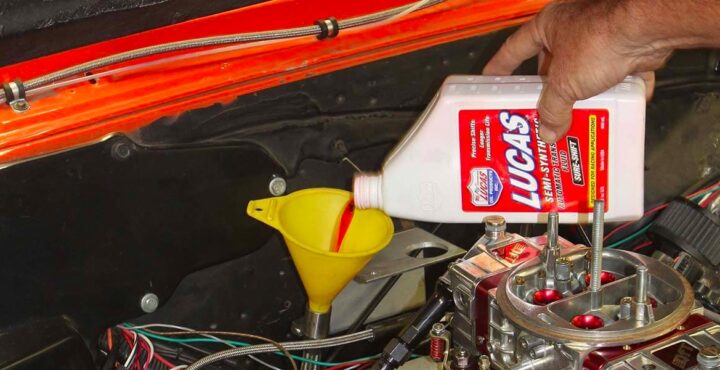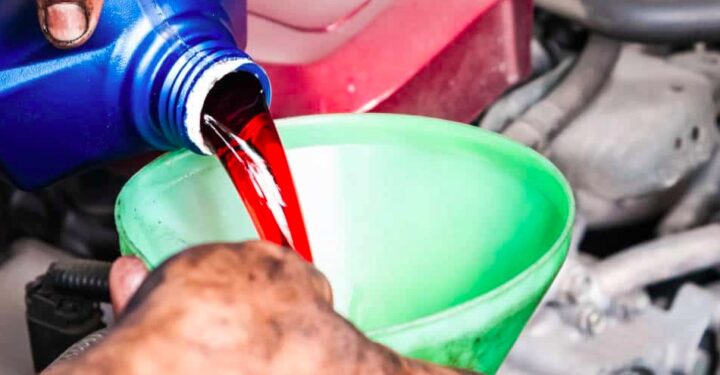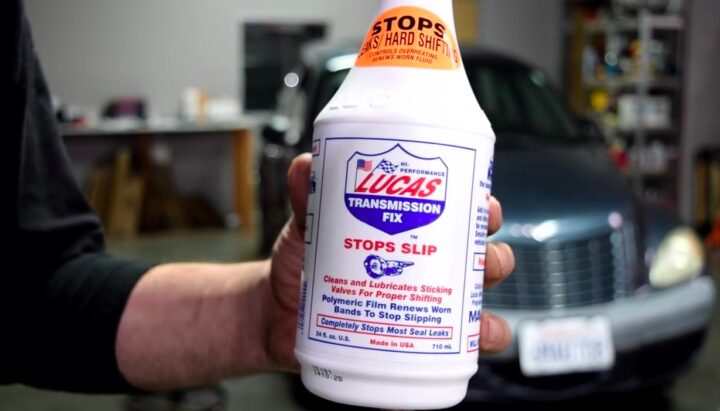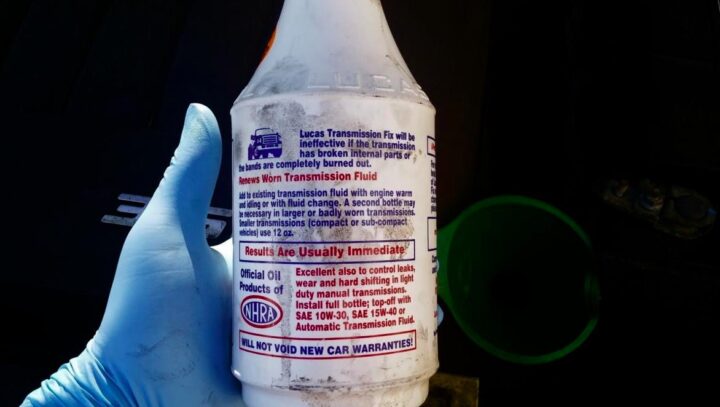Lucas Transmission Conditioner is a product that not many people have heard about. It’s a product you can use to protect your car from transmission fluid leaks and other problems, but it’s surprisingly affordable.
In this blog post, we’ll explore the pros and cons of Lucas Transmission Conditioner to help you decide whether or not to buy it for your vehicle. You can also use Lucas Fuel Stabilizer in conjunction with their tranny conditioner. It is a fuel additive that promises to help your car run smoother, cleaner, and with less wear on the engine.
Lucas Transmission Fix is a petroleum-extracted additive that helps to correct problems and prevent new ones in automatic transmissions. It completely eliminates most seal leaks, lowers operating temperatures for hard-working trannies, installs easily with no fluid changes necessary!
Most vehicles that have worn out their factory transmission fluid and filters will need at least a quart in order to get the proper level. The Lucas additive is intended for use when performing a complete flush. It reduces friction, lowers operating temperatures, speeds up lubrication, and allows dirt particles in the fluid a chance to settle out.
I’m not sure if Lucas Transmission Conditioner is worth it, but at least with my blog post, you’ll know the facts before deciding. The good news is that we’ve collected all of the information for you here in one place!
You can read about what Lucas Transmission Conditioner does, how to use it, and more below. I hope you enjoy reading this article – happy motoring!!
Table of Contents
Is Lucas Transmission Conditioner Worth It?
Lucas Transmission Conditioner is an automatic transmission fix product that is supposed to solve all of your problems. It’s also the only product endorsed by NASCAR driver Casey Mears, who drives for Germain Racing.
Well, in this article I’ll give you the facts behind Lucas Automatic Transmission Conditioner. I have reviewed other Lucas Oil products. Generally, the outcome is not too favorable to Lucas. This is based on personal experience, what the online community says, and other evidence directly from Lucas or from test results.
That is not to say they all Lucas products are not worth it. They can offer immense value if used correctly. But each product should be used, like all similar products, with caution and with complete knowledge about possible outcomes. There are a few situations where Lucas Transmission Conditioner has been used correctly and to good results.
But first, I’ll start with the basics of what is Transmissions Conditioner.
Lucas Automatic Transmission Conditioner Facts
The product works by adding friction modifiers to the fluid which increase its ability to stop metal-on-metal contact inside your transmission.
The friction modifiers adjust the coefficient of friction. This reduces the chance of metal on metal contact which is a leading cause of transmission failure according to some sources.
Metal on metal contact will damage your transmission by grinding it away over time, making it less efficient and safe for continued use. Reducing this friction means lower heat and thus preserving its life.
Lucas Automatic Transmission Conditioner also reduces the effects of heat and pressure on transmission failure. This is why it can help with overheating, but this claim has no evidence to back its effectiveness based on personal testing (though some state otherwise). If true, one might imagine how it can reduce things like transmission pops or leaks as well.
It can be used in any automatic transmission, old or new. Lucas states the product is safe for your transmission and won’t cause damage to any part of it. Its website also discusses a few cases where the product has been used successfully.
Now, let’s start with talking about how this product would have been used in some example situations.
Lucas Transmission Conditioner Best Uses
Casey Mears, who drives for Germain Racing in the NASCAR Sprint Cup Series, is an endorser of the product and he claims that it has helped him through countless races. He states on their website (which I will link below) that Lucas Oil products give him the edge he needs to win races and by winning races, he gets sponsorships.
We use Lucas Oil Products in our racecars every week and rely on their quality and consistency. That’s why I recommend them to the fans. If you’re racing for wins (and) you can’t afford any advantage, then Lucas is for you.
This quote is taken from Casey Mear’s personal website. I’ve linked it below for you to check out yourself. For those of you familiar with NASCAR, he is not one of the more recognized drivers on the Sprint Cup circuit. However, there are also no negative reports about Mears that I know of. This makes his endorsement of Lucas Transmission Conditioner all the more fascinating.
This is not to say that he cannot be trusted, but I find it odd that someone like him would endorse this product if there was no evidence or successful tests to back up its effectiveness. So if Mears can win these races using this product, then everyone should want a chance at it.
But what about the online community? Do they have anything to say about this product? Let’s find out together with a few quotes from forums and blogs that I found. I will try to keep my personal opinion on these products as unbiased as possible, but of course, you can form your own opinion after reading what I have to say.
Does Lucas Transmission Conditioner Work?
There are forum posts, product reviews, and lots of online commentaries that have many different things to say about the conditioner:
“Lucas is total crap. It’s not even worth the sale price at AutoZone for this junk. People buy it because they don’t know better.”
The blogger, who goes by the name “BigJoeD”, says this about Lucas Transmission Conditioner after testing it out himself.
“In my opinion, Lucas Transmission Fix is a waste of money. It does not live up to its claims and I am very disappointed. However, if you are looking for some kind of miracle potion or fix – this is NOT what you are looking for.”
The blogger here, who goes by the name “Snoopg8308”, says this about Lucas Transmission Conditioner after testing it out himself.
“A few real-world tests showed no difference between it and water on my car, so I stopped using it.”
The poster had said that he put Lucas Transmission Conditioner into his car and ran his usual tank of gas through it. According to the OP, he felt that there was no difference between using this product and not using any at all.
“It works as an effective transmission pan additive, but does nothing for gears or valves.”
According to OP, he had used Lucas Transmission Conditioner for 6 months. After that time frame, he saw no difference in power or mileage.
“Lucas Oil products are the biggest scam out there. They simply do nothing!”
According to the OP on this particular topic, Lucas Oil products are “money-wasters”.
Now, there are countless other forum posts out there about Lucas products. Some are good and some are bad. What I just presented to you were just a few that I felt would best represent the overall consensus on these products.
One thing is certain though, which is that this product, as well as other Lucas Oil products, has a market. If it didn’t work for others, then why would this product still be on the market and keep selling?
How Long Does It Take For Lucas Transmission Conditioner To Work?
After adding it to your transmission, you should drive around for 15 – 20 minutes in order for it to take effect. You’ll notice the effects almost immediately! Some people claim that your car will drive smoother.
Can I Add Lucas Transmission Fix Without Draining?
Yes! You can add Lucas Transmission fix into your transmission with existing fluid without completely draining it. If there are still some little spots left over after adding in this product, you can drive around for a bit and then drain your transmission fluid.
Adding transmission additives to your transmission is easy. You do not have to completely drain your transmission. The process is a lot easier for a person who knows what they are doing.
Lucas transmission additive has been used by some of the largest companies in America to prolong life and/or improve performance on many different types of equipment, including but not limited to: farm equipment, semi-trucks, boats, airplanes, and more. Not only does it maintain better performance, but it improves the safety of those that use or work on the equipment as well.
Lucas Transmission Fix is a petroleum-extracted additive designed to correct existing problems and prevent new ones in automatic transmissions. Lucas Transmission Fix stops slip, hesitation, and rough shifting in worn transmissions.
How Long Will A Slipping Transmission Last?
A slipping transmission is the first sign of a major issue. You may need a new clutch, have a fluid leak, or maybe just a faulty sensor. Either way, it is impossible to guess how long a transmission may last. It could go out on your next drive or it could last weeks or months. I
There can be a range of issues. But the best thing to do it take it to a trusted mechanic as soon as you start to feel your transmission slipping. Typically, a slipping transmission will last for quite some time until it fails completely.
It is a fool’s bet to stretch the time before fixing your transmission. While it may be a money or time issue with some people, if your transmission causes a bigger problem it will cost much more time and money than just taking it in sooner than later.
Repair Your Transmission Or Wait? FAQs
1. How Much Does It Cost For A Transmission Flush?
A fluid change is cheap, usually between $50 and $60 if your owner’s manual says to use an OEM fluid. Though you’ll pay more than that at quick care places or other lube shops. … A full flush will run you about $75-$100 depending on where you
2. Can You Change Your Own Transmission Fluid?
Yes, but it’s not an easy job to do yourself. It’s best to have someone with experience working on transmissions do the work for you! Changing the fluid in a vehicle can be dangerous if done wrong or without enough knowledge because of how delicate transmissions are.
3. How Often Should I Replace My Transmission Fluid?
This answer depends on which car you own, how much you drive it, and what type of transmission fluid your car needs. There are different types of transmission fluids that serve specific purposes depending on the year, make, and model of your vehicle. Some people change their fluid every 30k miles, some every 60k. There is no right answer for how often you should change your transmission fluid.
4. How Long Does It Take To Replace A Transmission?
The average cost of replacing an automatic transmission can vary from as little as $1,000 to as much as $8,000. In the majority of cases, you can expect to pay between $1,500 and $4,000 for a transmission replacement.
Is Lucas Transmission Fix Bad?
Lucas Transmission Fix can be a good option for anyone who has had trouble with their transmissions. It fixes virtually any issue and usually solves the problem quickly, as long as you’ve identified some common symptoms like slipping or hard shifting in addition to seal leaks that have been going on too long!
Lucas transmission fix gets good reviews online, although some people complain about its price. If it’s just a few bucks more than your average oil change, though, then it’ll be well worth the investment!
Lucas transmission conditioner reviews are often good, but there have been some complaints about the smell. It can be pretty strong if you don’t let it dry first!
Are Transmission Additives Worth It?
Transmission additives are mostly worthless. They do absolutely nothing but increase your wallet size and give you false hope that they will actually work.
It seems like many people buy these types of products, not because they work or see a real benefit from using them, but instead of feeling like they were “taken” by the mechanic for an unnecessary service when he always tells them that their transmission fluid is dirty or worn out.
Is Synthetic Transmission Fluid Worth It?
A synthetic fluid has the capability of providing your transmission with a smoother operation. The superior engineering provides for better lubrication and sustainment under variations in temperature, even if you’re driving through extremely hot or cold weather conditions! … Although most companies would like you to think that their product is best, my advice is synthetic transmission fluid.
The answer might surprise you; I prefer a synthetic lubricant when it comes to the actual fluid in your transmission. … There are some benefits to be had from using an additive like Lucas Transmission Fix, but it’s not the best way to maintain or improve your transmission.
Synthetic Transmission Fluid Compared To Petroleum-Based Transmission Fluid?
In a word, yes. Better quality fluids provide better protection and performance in your transmission. The vehicle manufacturers offer a synthetic fluid that is engineered specifically for your vehicle’s transmission to provide the best possible performance under the extreme conditions that the transmission experiences throughout its life.
Transmission Problems FAQs
1. Is Lucas Transmission Fix Bad For My Car?
Lucas does market their products as help with the above-listed issues, but do they work? … Don’t risk damaging your vehicle by putting a low-grade additive in it when you can buy a synthetic oil that is specially formulated for your application with the potential of saving you thousands of dollars down the road.
2. Does Lucas Transmission Fix Work?
When it comes to transmission fix products, most are not worth your time or money so let’s be honest and say that there is no such thing as a 100% effective and reliable transmission additive. … Your best bet is to go with a synthetic or synthetic blend fluid for your transmission.
3. Does Lucas Transmission Fix Work On Manual Transmissions?
Lucas Transmission Fix can be used in both automatic and manual transmissions, but it’s best to check with the owner’s manual of your vehicle for compatibility issues before adding it to your car. … I recommend synthetic or synthetic blend fluids for most vehicles (check with your owner’s manual for the recommendations) as the best type of transmission fluid.
4. Is Lucas Transmission Fix Safe To Use?
Additives can’t really be “safe” per se, but typically they are labeled as being safe for your specific application. However, there are some products out there that may say they are “safe” or “compatible” with most types of vehicles but the seller doesn’t really do enough research before making that blanket statement.
5. Is Lucas Transmission Fix Permanent?
Lucas Transmission Fix works to “restore” your existing transmission fluid to its original condition, so in a way it is permanent. … It is however recommended to change the transmission fluid every 30,000 miles or so for optimal performance.
6. Is Lucas Transmission Fix The Same As Additive For Transmission Fluid?
Yes, another example of a product that is also referred to as “transmission fix” would be Lucas Transmission Fix which is formulated to “restore” existing automatic transmission fluid to its original condition. Is it the same product? Yes, it’s made by the same company, but they market it differently.
7. Is Lucas Transmission Fix Bad For Automatic Transmissions?
Lucas Transmission Fix is designed to restore your existing automatic transmission fluid to its original condition so it would be best to check with your owner’s manual or visit a dealer for transmission fluid type compatibility.
I recommend synthetic or synthetic blend fluids for most vehicles (check with your owner’s manual for the recommendations) as the best type of transmission fluid.
Main Takeaways – Is Lucas Transmission Conditioner Worth It?
Conclusion paragraph: Lucas Transmission Conditioner is a great product for anyone who wants to maintain their vehicle’s performance. A simple drive down the street can be enough time for debris and other particles to accumulate which causes wear on your transmission fluid.
Using this treatment, they are eliminated before any damage happens. If you want more information about how it works or why I recommend it so highly, check out our blog post “Is Lucas Transmission Conditioner Worth It?”
I don’t think that Lucas Transmission Conditioner is worth it. It can be hard to know whether or not a transmission conditioner will work for you, but there are many benefits of using ones like better gas mileage and smoother shifting.
If you’re thinking about buying a new car part, try out the Lucas Transmission Conditioner first! You may or may not notice an improvement in your vehicle’s performance as well as some other perks such as increased power and improved fuel economy.
The best thing is that if you don’t like it, they have a 3-year warranty on their product which means that you could return this item at any point within three years after purchase should something go wrong with it.
Thanks for reading and stay dirty











